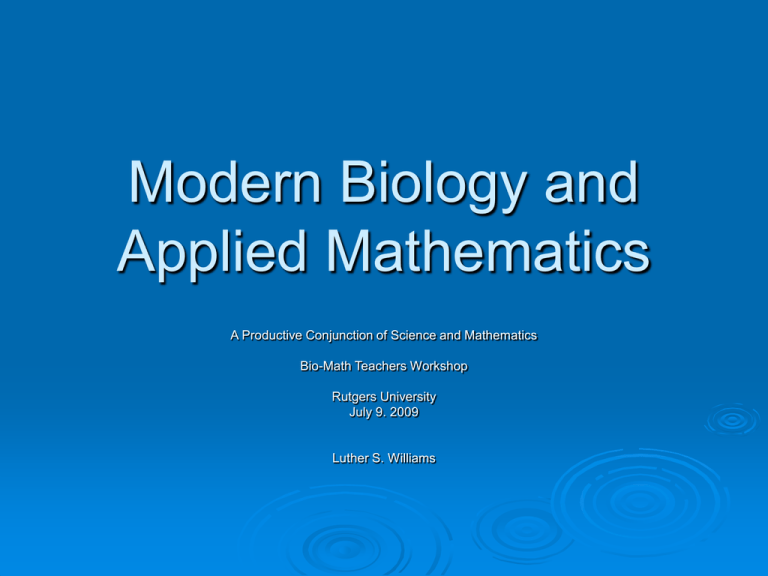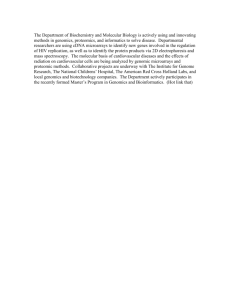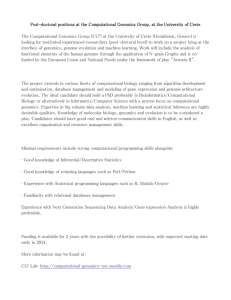Modern Biology and Applied Mathematics
advertisement

Modern Biology and Applied Mathematics A Productive Conjunction of Science and Mathematics Bio-Math Teachers Workshop Rutgers University July 9. 2009 Luther S. Williams Context In an idea or knowledge driven national and global context--- science and math for all students becomes mandatory The long path toward achievement of this goal– “National Education Goals, National Standards –curriculum, instruction and assessment-Movement, NCLB TIMSS, TIMSS-R and NAEP findings Science Teaching and Learning Science- distinctive character as an inquiry transaction-i. e., the demand of evidence, validation by observation, iterative knowledge construction, understanding in context, explorations of questions One that still is a rarely practice instructional undertaking One dependent upon reasonable mathematical skills and knowledge. Conversion of Computational, Mathematical and Natural Sciences The explosive rate of biological knowledge generation- owing to genome sequencing, molecular analyses, site- directed mutagenesis, simulation of a single microsecond of protein folding, the quantum representation of biochemical reactions involving only three to four atoms, the complexity of natural systems and system science has lead to--- a substantial infusion of applied mathematics for modeling and simulation of complex processes enabling high end computing; it has become the third arm of performing science- along with theory and experimentation molecular analyses of complex systems handling massive data sets in genomics and proteomics- bioinformatics ;and the support by the intersectorial science, engineering and technology as in DNA nanotechnologies. Nanoscale Science and Technology Can design and customize materials, products and tools- bioreactive- atom by atom Conduct studies at the scale at which living and non-living matter meet, e.g., the study of nanoscale processes at the surfaces –between microorganisms and the physical world Discover new links between biological, chemical and geological cycles that support life on Earth Learning “Bright and Shiny ones and set of Dull Ones’- Peter Sacks Learning Research How humans learn Interdisciplinary nexus of neurological, cognitive and behavioral sciences Social and physical contexts Science of Learning Intersection of biological, cognitive, computational, mathematical, physical and social science, engineering and education (issues- memory structure, machine learning, language, casual analysis, structure of disciplinary knowledge) Neural basis of learning, symbol systems, learning technologies, computational modeling (noninvasive tools to study the brain-MRI, PET, CAT) Genomics Analyses Protoemics- protein chips on slides of 1000s of proteins – detection, diagnosis and analyses’ Sequencing –identify and order nucleotides in DNA samples DNA libraries- unordered collection of cloned DNAs Functional genomics, comparative genomics, structural genomics Powerful Utility of Genomics and Proteomics The lost of microRNA genes that normally suppress chronic lymphocytic leukemia The discovery that silent mutations are not silent; they interfere with normal splicing of mRNA transcripts, e.g., phenylketonuria The rapid identification of Swine Influenza virus (A/HINI) as being composed of a hybrid genome – 3 sources Genetic modifications of the organism that produces an important drug, e.g., tetracycline Full structural analyses of the HIV-1 viral infectivity factor TYPICAL GENE MicroRNA GENE Messenger RNA MicoRNA Directs protein assembly Protein Binds to messenger RNA Protein assembly is blocked New Age -System Biology Genetics, genomics and proteomics – analysis of genes and proteins that interact Physical and biological chemistry-measure the interactions Imaging tools- to record where and when the interactions occur Structural biology- to understand why and how the molecules interact Computational expertise- to integrate all the above elements; build models Thus, against the incomplete variable resident in learning outcome intent and application, the standards- anchored science and mathematics curriculuminstruction- assessment continuum , enabled with one overarching variable best correlates with student learning, the science and/o mathematics teacher, must break rank with the status quo and engage the present and future conjunction of biology and mathematics!

